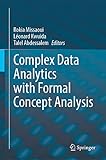Complex Data Analytics with Formal Concept Analysis [electronic resource] /
Material type: TextPublisher: Cham : Springer International Publishing : Imprint: Springer, 2022Edition: 1st ed. 2022Description: XXV, 260 p. 87 illus., 27 illus. in color. online resourceContent type:
TextPublisher: Cham : Springer International Publishing : Imprint: Springer, 2022Edition: 1st ed. 2022Description: XXV, 260 p. 87 illus., 27 illus. in color. online resourceContent type: - text
- computer
- online resource
- 9783030932787
- 006.3 23
- Q334-342
- TA347.A78
Chapter. 1 -- Formal Concept Analysis and Extensions for Complex Data Analytics -- Chapter. 2 -- Conceptual Navigation in Large Knowledge Graphs -- Chapter. 3 -- FCA2VEC: Embedding Techniques for Formal Concept Analysis -- Chapter. 4 -- Analysis of Complex and Heterogeneous Data using FCA and Monadic Predicates -- Chapter. 5 -- Dealing with Large Volumes of Complex Relational Data using RCA -- Chapter. 6 -- Computing Dependencies using FCA -- Chapter. 7 -- Leveraging Closed Patterns and Formal Concept Analysis for Enhanced Microblogs Retrieval -- Chapter. 8 -- Scalable Visual Analytics in FCA -- Chapter. 9 -- Formal methods in FCA and Big Data -- Chapter. 10 -- Towards Distributivity in FCA for Phylogenetic Data -- Chapter. 11 -- Triclustering in Big Data Setting.
FCA is an important formalism that is associated with a variety of research areas such as lattice theory, knowledge representation, data mining, machine learning, and semantic Web. It is successfully exploited in an increasing number of application domains such as software engineering, information retrieval, social network analysis, and bioinformatics. Its mathematical power comes from its concept lattice formalization in which each element in the lattice captures a formal concept while the whole structure represents a conceptual hierarchy that offers browsing, clustering and association rule mining. Complex data analytics refers to advanced methods and tools for mining and analyzing data with complex structures such as XML/Json data, text and image data, multidimensional data, graphs, sequences and streaming data. It also covers visualization mechanisms used to highlight the discovered knowledge. This edited book examines a set of important and relevant research directions in complex data management, and updates the contribution of the FCA community in analyzing complex and large data such as knowledge graphs and interlinked contexts. For example, Formal Concept Analysis and some of its extensions are exploited, revisited and coupled with recent processing parallel and distributed paradigms to maximize the benefits in analyzing large data.


There are no comments on this title.